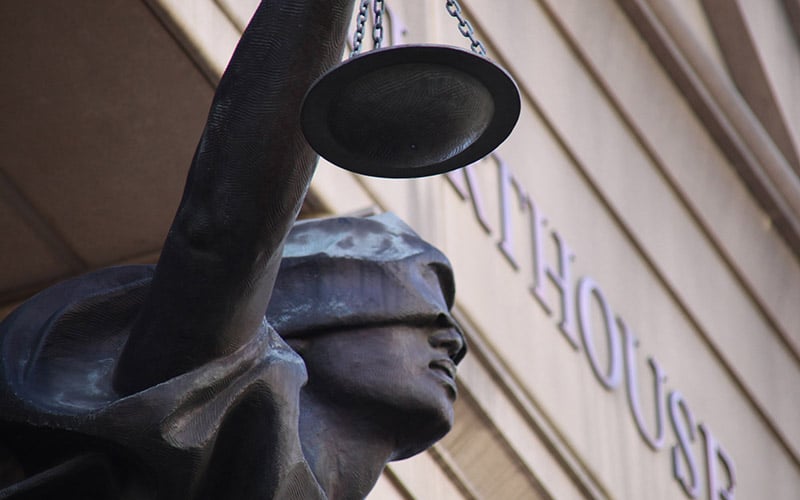- Slug: BC-CNS-Tribal Trial,730
- File photo available (thumbnail, caption below)
By DILLION EDDIE
Cronkite News
WASHINGTON – A divided federal appeals court Tuesday overturned the assault conviction of a Gila River Indian Community man, saying the tribal court failed to tell him he could get a trial by jury – if he asked.
A three-judge panel of the 9th U.S. Circuit Court of Appeals said Fortino Alvarez’s treatment by the tribal court fell short of the “fair treatment” required under federal law and his convictions for a 2003 assault on his girlfriend had to be reversed.
But Judge Alex Kozinski went on to pointedly criticize the behavior of the tribe’s courts, saying in a concurrence that the case was a reminder of a “rat’s nest” of problems in those courts that were first noted in 1999 and that have seen “too few reforms” since.
Calls to Gila River tribal offices seeking comment were not immediately returned Tuesday.
The case began in April 2003 when Alvarez, a member of the Gila River Indian Community, showed up drunk at his girlfriend’s home and started arguing with her, according to court documents.
Alvarez, then 20, hit his 15-year-old girlfriend with a flashlight, pulled a knife on her and then “clubbed” her brother when he tried to intervene. Alvarez left, but not before threatening to come back and kill their entire family.
Alvarez was arrested and charged with assault, domestic violence, criminal threats and misconduct involving a weapon. He was given a defendant’s rights form by the tribal court indicating, among other things, the right to a jury trial if he asked for one.
At a group arraignment, Alvarez told the judge he did not have any questions about his rights. He represented himself at trial four months later, when the appeals court said he presented no evidence, no witnesses, nor a closing argument in his defense and declined to cross-examine a witness against him, telling the judge that everything the witness said was true.
He was convicted on all counts but making criminal threats and sentenced to five years.
On appeal, Alvarez argued that the tribal court had an obligation to tell him that he had to ask for a jury trial under the Indian Civil Rights Act, which says tribes may not deny defendants facing time in prison “the right, upon request, to a trial by jury.”
A lower court disagreed, but the appeals court sided with Alvarez, saying the tribal court’s expectation that he would understand more about his rights was “unreasonable.”
At the time of his trial, Kozinski said in his opinion, Alvarez was barely out of teens, had a seventh-grade education and represented himself even though he told the judge he didn’t “really know about court that much.” The court made no effort to advise him of his rights, Kozinski wrote, even though the trial judge noted Alvarez was “having a hard time understanding the procedures.”
While federal courts are “generally reluctant to trench upon tribal sovereignty,” the failure to notify him of the obligation to ask for a jury trial violated his right to fair treatment. It required automatic reversal of his conviction, the court said.
In a partial dissent, Judge Diarmuid O’Scannlain said that Alvarez could not have been denied the right to a trial by jury on request, if he never requested it. He said the majority had “devised a clever way to vindicate Alvarez’s due process rights” that were not spelled out in the law.
But Kozinski said the “rat’s nest” of problems with the Gila River Indian Community courts could provide criminal defendants an avenue for appeal in the future if not corrected. He pointed to a 1999 circuit court opinion expressing “doubt that a functioning appellate court exists” in the tribe and said there has been little improvement since.
Kozinski ticked off a list of problems. Alvarez got only five days to file an appeal, “the shortest such window I have ever heard of,” wrote Kozinski, who said Alvarez was jailed for nine years with no guidance on how to appeal and no jailhouse law library that would allow him to do his own research, among other problems.
Alvarez was “released years ago, after having spent most of his 20s” in jail, but Kozinski said his case “need not be a total loss.”
“Perhaps (the tribe) and others like it will take this opportunity to reconsider the dubious procedures they employ in their criminal courts,” Kozinski wrote.
^__=
Web links:
_ Alvarez v. Tracy: http://cdn.ca9.uscourts.gov/datastore/opinions/2016/08/30/12-15788.pdf
_ Gila River courts: http://www.gilariver.org/index.php/government/judical-branch
^__=
A federal appeals court overturned a Gila River Indian Community man’s convictions, saying a tribal court failed to give him a chance for a jury trial, one of a “rat’s nest” of problems in the tribe’s courts, the ruling said. (Photo by Tim Evanston/Creative Commons)
